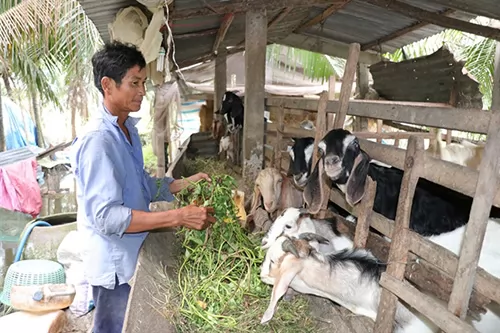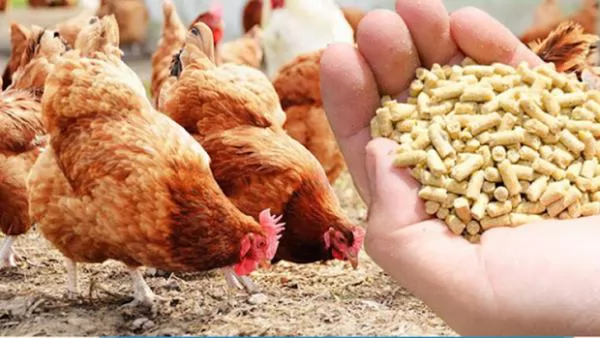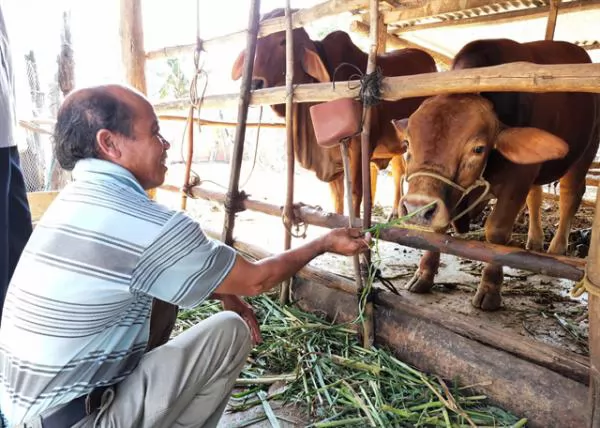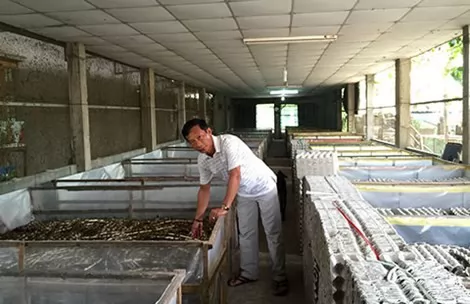Goat breeding brings high incomes to farmers in Bến Tre

A farmer breeds goats in Bến Tre Province. - VNA/VNS Photo Huỳnh Phúc Hậu
BẾN TRE – Breeding goats has helped many farmers in the Cửu Long (Mekong) Delta province of Bến Tre escape poverty and have a stable income as the animal is easy to breed and does not require large investment.
Nguyễn Văn Chí from Giồng Trôm District’s Phong Mỹ Commune has switched to goat breeding after farming a 2,000-sq.m rice field and occasionally working as a daily hired worker.
Chí borrowed bank loans to buy male goats to breed mostly for meat and female goats for reproduction purposes.
He now has more than 20 female goats and more than 30 male goats, earning a profit of VNĐ120 – 140 million (US$5,160 – 6,000) a year.
Similarly, Huỳnh Ngọc Đức from Giồng Trôm’s Châu Bình Commune has escaped poverty from breeding goats and has a stable life now.
Đức bought one female goat for breeding in 2010 and now has more than 100 goats.
He has switched from breeding Bách Thảo to Boer goats as the latter is preferred in the local market.
Boer female goats can deliver babies three times in two years. A 3-month-old Boer goat can be sold for meat after breeding for five to six months.
“I breed Boer goats because they produce more meat and have a shorter breeding period,” Đức said.
Nguyễn Thành Nu, deputy chairman of the Bình Châu Commune Farmers Association, said the commune had about 20 effective goat breeding models which had helped reduce poverty.
Goats have few diseases and can live well in saltwater-affected areas in the province’s coastal districts.
Võ Hoài Phong, who breeds more than 60 goats in the coastal district of Thạnh Phú, said that goats could thrive in harsh conditions as they can eat various types of leaves such as mangrove and other plants grown in saltwater areas.
He sells 30 – 40 goats a year, earning more than VNĐ100 million ($4,300) annually.
Bến Tre has more than 160,000 goats, according to the province’s Animal Health and Animal Husbandry Sub-department.
Trần Quang Thái, head of the sub-department, said the price of goats was high as domestic demand was increasing.
To further improve incomes, the province was building value chains for goats bred by local farmers. – VNS
Maybe you are interested

Vietnam rakes in 361 million USD from exporting poultry products
Vietnam has so far earned 361 million USD from exporting poultry meat and eggs to 26 countries worldwide, the Ministry of Agriculture and Rural Development (MARD) reported.

Gia Lai seeks to improve quality of beef cattle through cross-breeding
GIA LAI — Gia Lai Province, which has the largest beef cattle herd in the Tây Nguyên (Central Highlands) region, has undertaken many programmes to develop the quality of its animals by crossing native cows and hybrid bulls.

Breeding insects for export, a new industry for VN
VietNamNet Bridge - The most difficult procedures in insect export is asking for the certificate of quality, size and the certificate of origin for insects.





